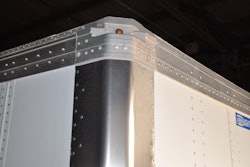While power steering and transmission fluid can be recycled, motor oil and anti-freeze rank big among recycled truck fluids.
Major oil manufacturers see the value in taking that filthy black crude and making it new again.
“The new recycling techniques yield high-quality base oil that can match crude oil,” Valvoline reports on its website. “Valvoline NextGen uses some of the highest quality recycled oil and a breakthrough formula for performance, which meets or exceeds industry specifications.”
In addition to draining the oil pan, used motor oil can also be obtained from filters. Some shops have chosen to invest in oil filter crushers which not only extract additional oil, but also render the filter into a crushed lump of recyclable metal.
Oil is a popular commodity and its price fluctuations affect the used oil market as well.
“Used motor oil is a big one. It fluctuates back and forth,” Quest CEO Ray Hatch said. “We’ve gone through a cycle where it was very low. So instead of getting paid for it or having it be cost-neutral based on the value of the commodity during that period of time, clients had to pay to have it taken away.
“So if you picture whatever the commodity is that has a value which fluctuates but the service to pick it up and recycle it appropriately has a cost as well,” Hatch continued. “When the value of the commodity is more than that, there’s more to share that way and the client can actually get paid. A generator can actually get some money for that recycling point.”
While the used anti-freeze market does not enjoy the same prominence as used oil, fleets can still enjoy some savings by having their coolant recycled on site or by investing in an anti-freeze recycler of their own.
KFM in Ohio manufactures the Coolant Purification System which can recycle 150 gallons of anti-freeze an hour. Corrosion inhibitors are added to restore coolant to its original specs.
“The only by-products we have are spent resins and the filters,” said KFM owner Lincoln Remmert. “The spent resins are typically a non-hazardous waste. One or two sets of filters could end up in hazardous waste if you put something that’s high in lead concentration in it to start with.”
Recycling anti-freeze on site provides some regulatory benefits.
“By recycling on site you enjoy certain exemptions from waste regulations,” Remmert explained. “For instance, if you generated, recycle and reuse your material on site it will be exempted from some of the hazardous waste regulations. But you have to generate there which means taking it out of your trucks, recycle it there, run it through our machine and then recharge the trucks—put it back into the trucks there on site.”











